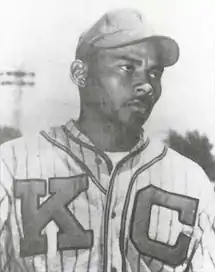| Hilton Smith | |
|---|---|
 | |
| Pitcher | |
| Born: February 27, 1907 Giddings, Texas, U.S. | |
| Died: November 18, 1983 (aged 76) Kansas City, Missouri, U.S. | |
Batted: Right Threw: Right | |
| Negro league baseball debut | |
| 1932, Monroe Monarchs | |
| Last appearance | |
| 1948, Kansas City Monarchs | |
| Negro league statistics | |
| Win–loss record | 70–38 |
| Earned run average | 2.92 |
| Strikeouts | 594 |
| Teams | |
| |
| Career highlights and awards | |
| |
| Member of the National | |
| Induction | 2001 |
| Election method | Veterans Committee |
Hilton Lee Smith (February 27, 1907[1] – November 18, 1983) was an American right-handed pitcher in Negro league baseball. He pitched alongside Satchel Paige for the Kansas City Monarchs and Bismarck Churchills between 1932 and 1948. He was inducted into the National Baseball Hall of Fame in 2001.
Early life
Born in Giddings, Texas, Smith began his career in black baseball's equivalent of the minor leagues with the Austin Black Senators in Austin, Texas. Smith made the dean's list as a student at Prairie View A&M College in 1928 and 1929. He was an outfielder in his first college season and a pitcher in his second year.[2]
His big league debut was with the Monroe Monarchs of Monroe, Louisiana in 1932. In 1934, Smith wed Louise Humphrey. They had two children.[3]
Semi-pro career
From 1935 to 1936, Smith pitched for the Bismarck semi-professional team organized by Neil Churchill. In 1935, his teammates included Satchel Paige, Ted "Double Duty" Radcliffe, Quincy Trouppe, Barney Morris, and Chet Brewer. In August, the team won the national semipro championship in Wichita, Kansas. In 1936, Paige, Radcliffe, and Brewer departed and Smith became the ace of the Bismarck team. They returned to the national championship, where Smith won four games, but Bismarck failed to repeat as champions.[4]
Negro league career
In late 1936, Smith signed with the Kansas City Monarchs. From 1937 until his retirement in 1948, Smith was a star pitcher on the Monarchs. He possessed an outstanding curveball, but was overshadowed by his more flamboyant teammate Satchel Paige. Often Paige would pitch the first three innings of a game, leaving Smith to pitch the remaining six. Also, unlike Paige, Smith was a very good hitter.
Post-playing career and death
After retiring from baseball, Smith worked as a schoolteacher and later as a steel plant foreman. He also scouted for the Chicago Cubs. Smith had a quiet, reserved temperament, but in his later years he stood up for Negro leaguers in their struggle to be inducted into the Baseball Hall of Fame. He died in 1983 in Kansas City, Missouri. It was not until 2001 that he was posthumously inducted into the Baseball Hall of Fame.
Notes
- ↑ During his lifetime, Smith claimed that his birth-date was 1912, which is the date shown in several references such as Riley, p. 723. Nearly 20 years after his death, however, historian Larry Lester discovered information and confirmed that his actual birth-date was February 27, 1907; see Thornley, p. 136.
- ↑ "Hilton Lee Smith inducted into the Prairie View A&M Sports Hall of Fame". Prairie View A&M University. Retrieved January 3, 2015.
- ↑ Porter, David, ed. (2000). Biographical Dictionary of American Sports: Q-Z. Greenwood Publishing Group. pp. 1434–1435. ISBN 0313311765. Retrieved January 3, 2015.
- ↑ McNary, Kyle P. (2001). "North Dakota Integrated Baseball History". Pitch Black Baseball. Archived from the original on July 25, 2008. Retrieved November 22, 2009.
References
- Clark, Dick; Lester, Larry (1994), The Negro Leagues Book, Cleveland, Ohio: Society for American Baseball Research
- Hogan, Lawrence D. (2006), Shades of Glory: The Negro Leagues and the Story of African-American Baseball, Washington, DC: National Geographic, ISBN 0-7922-5306-X
- Riley, James A. (1994), The Biographical Encyclopedia of the Negro Baseball Leagues, New York: Carroll & Graf, ISBN 0-7867-0959-6
- Thornley, Stew (2006), Baseball in Minnesota: The Definitive History, St. Paul, MN: Minnesota Historical Society Press, ISBN 0-87351-551-X
External links
- Hilton Smith at the Baseball Hall of Fame
- Career statistics and player information from Baseball Reference and Baseball-Reference Black Baseball and Mexican League stats and Seamheads
- Hilton Smith at the SABR Baseball Biography Project
- Hilton Smith at Find a Grave